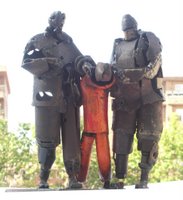 Richard Haass, President of the Council on Foreign Relations, has just written a piece about the status the current struggle against terrorism. He argues the record of success is very mixed at best. He points out that globalization makes international terrorism easier then ever before and is concerned about the new generation of terrorists gaining experience in Iraq as the previous generation did in Afghanistan twenty years ago.
Richard Haass, President of the Council on Foreign Relations, has just written a piece about the status the current struggle against terrorism. He argues the record of success is very mixed at best. He points out that globalization makes international terrorism easier then ever before and is concerned about the new generation of terrorists gaining experience in Iraq as the previous generation did in Afghanistan twenty years ago.What is to be done? He is not particularly optimistic about the promotion of democracy, at least as practiced by the Bush administration, as creating the climate to undermine the appeal of terrorist action. He writes,
So what needs doing?
One answer put forward by the Bush administration is to promote democracy. The thinking is that young men and women will be less likely to become terrorists if they are members of societies that provide them with political and economic opportunities to live meaningful and satisfying lives.
Unfortunately, the evidence does not support this. Individuals growing up in mature democracies such as the United Kingdom can still become alienated and radicalized. A more democratic Iraq has become a more violent Iraq. Similarly, elections in Palestine did not persuade Hamas to turn its back on violence any more than elections in Lebanon dissuaded Hezbollah from initiating the current crisis in the Middle East.
Moreover, even if democracy were the answer, it is extraordinarily difficult to bring about, as Iraq shows. Building a true democracy (as opposed to simply holding elections) is an enterprise that requires decades or even generations. In the meantime, however, we require a policy to deal with the terrorism that confronts us.
What is more, democracy is irrelevant to those who are already
committed terrorists. Their goals of re-creating some 7th century caliphate or,
in the case of Iraq, restoring Sunni domination are unlikely to be satisfied by
free men and women openly choosing their political system and
leadership.
Haas does not think much of the current “war” rhetoric coming out of Washington regarding terrorism and thinks it is misleading and overlooks effective ways to combat terrorism:
… we must drop the metaphor of a “war on terrorism.” Wars are mostly fought
with arms on battlefields between soldiers of opposing countries. Wars have
beginnings and ends. None of these characteristics apply here. Terrorism can now
be carried out with boxcutters and airplanes as easily as with explosives.
Office buildings and commuter trains and coffee shops are today's battlefields.
There are no uniforms, and often those doing the killing are acting in the name
of causes or movements. And there is no end in sight. To the contrary, terrorism
is now part of the fabric of contemporary life.
Another reason to jettison the martial vocabulary is that terrorism cannot be defeated by arms alone. Indeed, other instruments of policy, including intelligence, police work and diplomacy, are likely to play a larger part in any effective
policy.
Read his piece here.
No comments:
Post a Comment